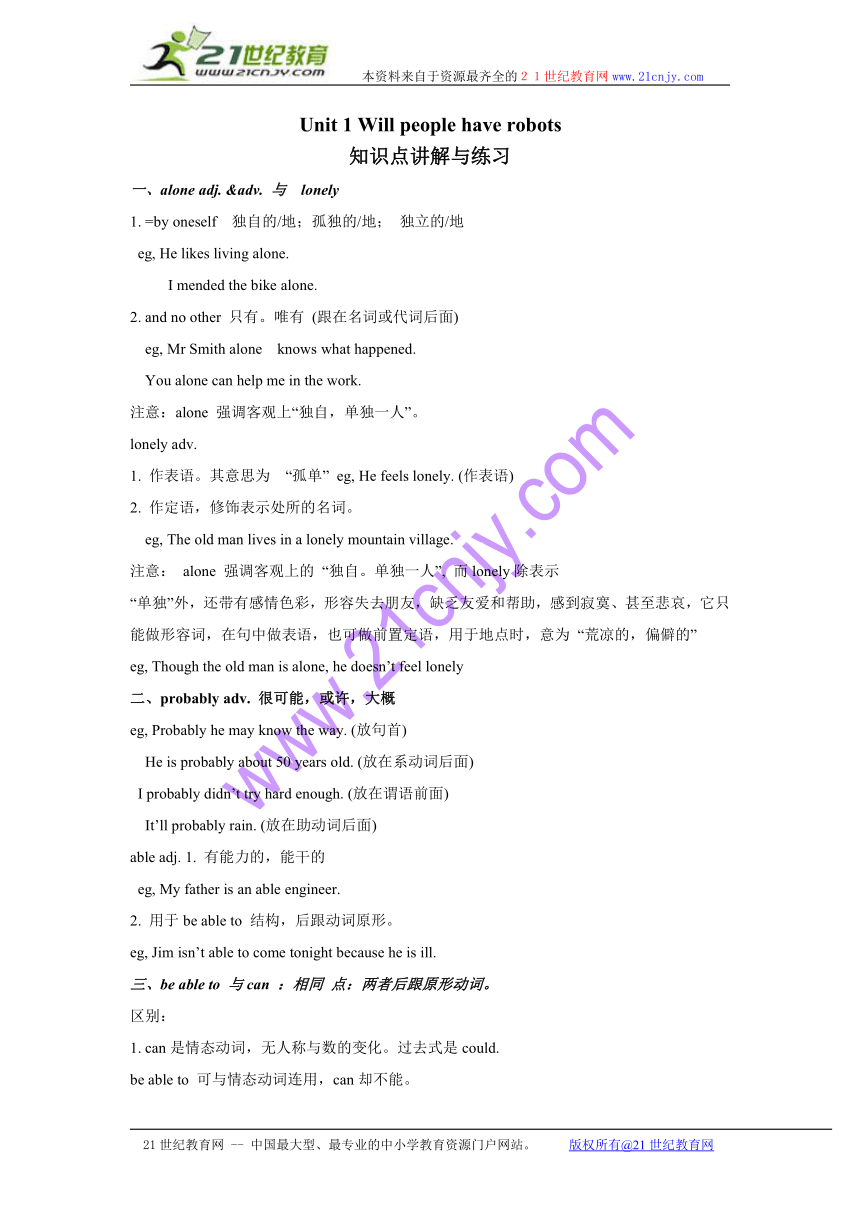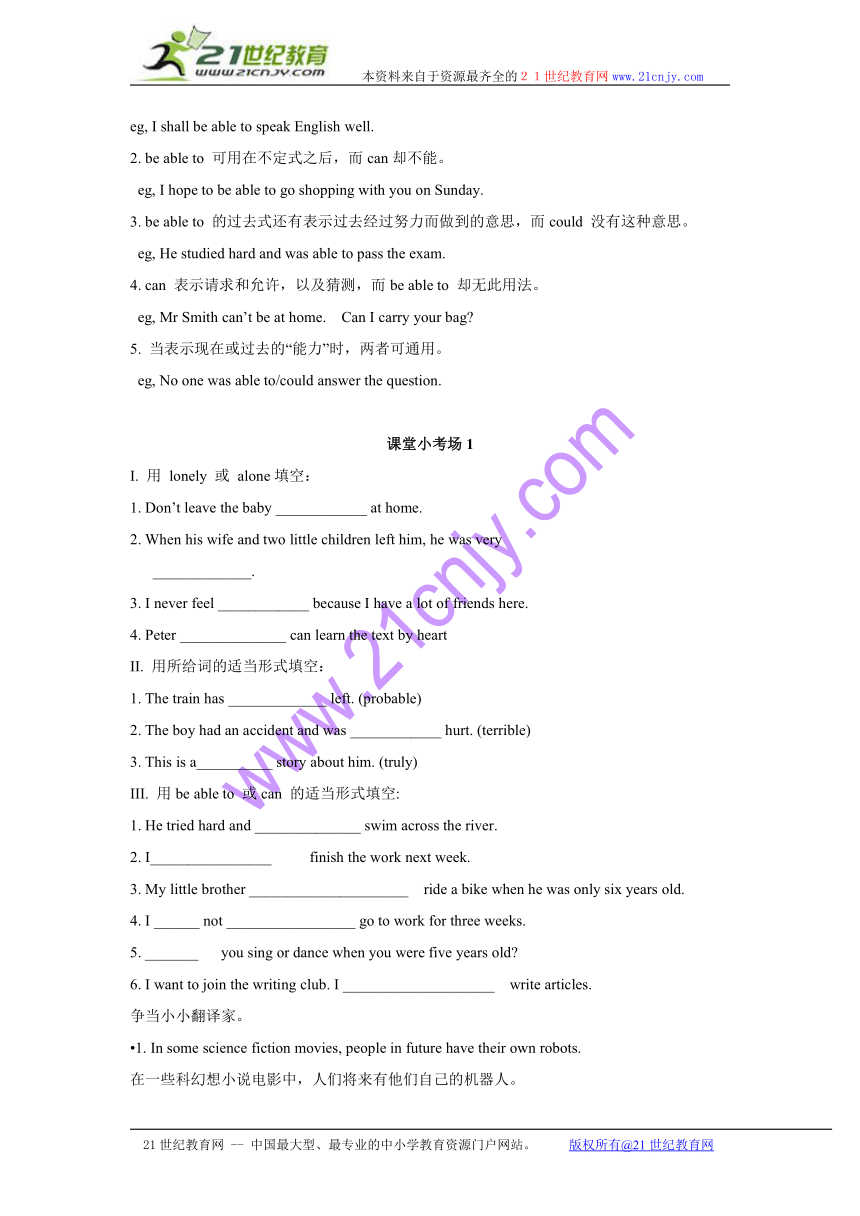鲁教版 英语学案:八年级上unit 1 will people have robots
文档属性
| 名称 | 鲁教版 英语学案:八年级上unit 1 will people have robots |

|
|
| 格式 | rar | ||
| 文件大小 | 13.7KB | ||
| 资源类型 | 教案 | ||
| 版本资源 | 鲁教版(五四学制) | ||
| 科目 | 英语 | ||
| 更新时间 | 2010-08-19 00:00:00 | ||
图片预览


文档简介
本资料来自于资源最齐全的21世纪教育网www.21cnjy.com
Unit 1 Will people have robots
知识点讲解与练习
一、alone adj. &adv. 与 lonely
1. =by oneself 独自的/地;孤独的/地; 独立的/地
eg, He likes living alone.
I mended the bike alone.
2. and no other 只有。唯有 (跟在名词或代词后面)
eg, Mr Smith alone knows what happened.
You alone can help me in the work.
注意:alone 强调客观上“独自,单独一人”。21世纪教育网
lonely adv.
1. 作表语。其意思为 “孤单”
eg, He feels lonely. (作表语)
2. 作定语,修饰表示处所的名词。
eg, The old man lives in a lonely mountain village. [来源:21世纪教育网]
注意: alone 强调客观上的 “独自。单独一人”, 而lonely除表示
“单独”外,还带有感彩,形容失去朋友,缺乏友爱和帮助,感到寂寞、甚至悲哀,它只能做形容词,在句中做表语,也可做前置定语,用于地点时,意为 “荒凉的,偏僻的”
eg, Though the old man is alone, he doesn’t feel lonely
二、probably adv. 很可能,或许,大概
eg, Probably he may know the way. (放句首)
He is probably about 50 years old. (放在系动词后面)
I probably didn’t try hard enough. (放在谓语前面)
It’ll probably rain. (放在助动词后面)
able adj. 1. 有能力的,能干的
eg, My father is an able engineer.
2. 用于be able to 结构,后跟动词原形。
eg, Jim isn’t able to come tonight because he is ill.
三、be able to 与can :相同 点:两者后跟原形动词。
区别:
1. can是情态动词,无人称与数的变化。过去式是could.
be able to 可与情态动词连用,can却不能。
eg, I shall be able to speak English well.
2. be able to 可用在不定式之后,而can却不能。
eg, I hope to be able to go shopping with you on Sunday.
3. be able to 的过去式还有表示过去经过努力而做到的意思,而could 没有这种意思。
eg, He studied hard and was able to pass the exam.
4. can 表示请求和允许,以及猜测,而be able to 却无此用法。
eg, Mr Smith can’t be at home. Can I carry your bag
5. 当表示现在或过去的“能力”时,两者可通用。
eg, No one was able to/could answer the question.
课堂小考场1
I. 用 lonely 或 alone填空:
1. Don’t leave the baby ____________ at home.
2. When his wife and two little children left him, he was very
_____________.
3. I never feel ____________ because I have a lot of friends here.
4. Peter ______________ can learn the text by heart
II. 用所给词的适当形式填空:
1. The train has _____________ left. (probable)
2. The boy had an accident and was ____________ hurt. (terrible)
3. This is a__________ story about him. (truly)
III. 用be able to 或can 的适当形式填空: [来源:21世纪教育网]
1. He tried hard and ______________ swim across the river.
2. I________________ finish the work next week.
3. My little brother _____________________ ride a bike when he was only six years old.
4. I ______ not _________________ go to work for three weeks.
5. _______ you sing or dance when you were five years old
6. I want to join the writing club. I ____________________ write articles.
争当小小翻译家。
1. In some science fiction movies, people in future have their own robots. 21世纪教育网
在一些科幻想小说电影中,人们将来有他们自己的机器人。
2. Some scientists believe that there will be such robots in the future.
一些科学家们相信将来会有这样的机器人。
3. Scientists are now trying to make robots look like people, and do the same things as us.
科学家们试着制造和人一样的机器人能像我们做一样的事
.
4. He thinks that it will be difficult for a robot to do the same things as a person.
他认为机器人像人一样做同样的事会很难.
5. It’s easy for a child to wake up and know where they are.
对一个孩子来说,醒来和知道在哪里是很简单的.
6. They think that robots will be able to talk to people in 25 to 50 years.
他们认为在20到25年中机器人就会与人交谈.
7. People would not like to do such jobs and would get bored.
人们不愿意做这些令人厌倦的工作.
8. In the future, there will be more robots everywhere, and humans will have less work to do.
在将来,到处会有更多的机器人,人们将会有较少的工作去做.
9. That may not seem possible now, but computers, space rockets and even electric toothbrushes seem impossible a hundred years ago.
那现在看起来似乎是不可能的,但是电脑,宇宙飞船和电子牙刷在一百年前看起来是不可能的.
10. We never know what will happen in the future!
我们从来不知道将来会发生什么.
课堂小考场2
1.I _______ (visit) my uncle tomorrow.
2.There _______ (be) a football match in our school next week.
3.He _______ (help) you with your English this evening.
4.They _________(play) soccer if it doesn’t rain.
5. We _________ (have) a meeting tomorrow.
翻译句子
1、你认为人们的家里会有机器人吗?
Do _______ ______ there will be robots _____ _____ homes
2、人们将活到150岁。
People _______ _____ ______ ______150 years old.
3、我认为她会当医生。
I think she ______ ____ a doctor.[来源:21世纪教育网]
4、你住哪儿? 我住在北京。
______ _____ _____ ______ I live in Beijing.
5、他反复看她的来信。
He read her letter ______ _______ _______ ________.
6、等了很长一段时间后他厌烦了。
He _______ _______ after he waited for long.
21世纪教育网 -- 中国最大型、最专业的中小学教育资源门户网站。 版权所有@21世纪教育网
Unit 1 Will people have robots
知识点讲解与练习
一、alone adj. &adv. 与 lonely
1. =by oneself 独自的/地;孤独的/地; 独立的/地
eg, He likes living alone.
I mended the bike alone.
2. and no other 只有。唯有 (跟在名词或代词后面)
eg, Mr Smith alone knows what happened.
You alone can help me in the work.
注意:alone 强调客观上“独自,单独一人”。21世纪教育网
lonely adv.
1. 作表语。其意思为 “孤单”
eg, He feels lonely. (作表语)
2. 作定语,修饰表示处所的名词。
eg, The old man lives in a lonely mountain village. [来源:21世纪教育网]
注意: alone 强调客观上的 “独自。单独一人”, 而lonely除表示
“单独”外,还带有感彩,形容失去朋友,缺乏友爱和帮助,感到寂寞、甚至悲哀,它只能做形容词,在句中做表语,也可做前置定语,用于地点时,意为 “荒凉的,偏僻的”
eg, Though the old man is alone, he doesn’t feel lonely
二、probably adv. 很可能,或许,大概
eg, Probably he may know the way. (放句首)
He is probably about 50 years old. (放在系动词后面)
I probably didn’t try hard enough. (放在谓语前面)
It’ll probably rain. (放在助动词后面)
able adj. 1. 有能力的,能干的
eg, My father is an able engineer.
2. 用于be able to 结构,后跟动词原形。
eg, Jim isn’t able to come tonight because he is ill.
三、be able to 与can :相同 点:两者后跟原形动词。
区别:
1. can是情态动词,无人称与数的变化。过去式是could.
be able to 可与情态动词连用,can却不能。
eg, I shall be able to speak English well.
2. be able to 可用在不定式之后,而can却不能。
eg, I hope to be able to go shopping with you on Sunday.
3. be able to 的过去式还有表示过去经过努力而做到的意思,而could 没有这种意思。
eg, He studied hard and was able to pass the exam.
4. can 表示请求和允许,以及猜测,而be able to 却无此用法。
eg, Mr Smith can’t be at home. Can I carry your bag
5. 当表示现在或过去的“能力”时,两者可通用。
eg, No one was able to/could answer the question.
课堂小考场1
I. 用 lonely 或 alone填空:
1. Don’t leave the baby ____________ at home.
2. When his wife and two little children left him, he was very
_____________.
3. I never feel ____________ because I have a lot of friends here.
4. Peter ______________ can learn the text by heart
II. 用所给词的适当形式填空:
1. The train has _____________ left. (probable)
2. The boy had an accident and was ____________ hurt. (terrible)
3. This is a__________ story about him. (truly)
III. 用be able to 或can 的适当形式填空: [来源:21世纪教育网]
1. He tried hard and ______________ swim across the river.
2. I________________ finish the work next week.
3. My little brother _____________________ ride a bike when he was only six years old.
4. I ______ not _________________ go to work for three weeks.
5. _______ you sing or dance when you were five years old
6. I want to join the writing club. I ____________________ write articles.
争当小小翻译家。
1. In some science fiction movies, people in future have their own robots. 21世纪教育网
在一些科幻想小说电影中,人们将来有他们自己的机器人。
2. Some scientists believe that there will be such robots in the future.
一些科学家们相信将来会有这样的机器人。
3. Scientists are now trying to make robots look like people, and do the same things as us.
科学家们试着制造和人一样的机器人能像我们做一样的事
.
4. He thinks that it will be difficult for a robot to do the same things as a person.
他认为机器人像人一样做同样的事会很难.
5. It’s easy for a child to wake up and know where they are.
对一个孩子来说,醒来和知道在哪里是很简单的.
6. They think that robots will be able to talk to people in 25 to 50 years.
他们认为在20到25年中机器人就会与人交谈.
7. People would not like to do such jobs and would get bored.
人们不愿意做这些令人厌倦的工作.
8. In the future, there will be more robots everywhere, and humans will have less work to do.
在将来,到处会有更多的机器人,人们将会有较少的工作去做.
9. That may not seem possible now, but computers, space rockets and even electric toothbrushes seem impossible a hundred years ago.
那现在看起来似乎是不可能的,但是电脑,宇宙飞船和电子牙刷在一百年前看起来是不可能的.
10. We never know what will happen in the future!
我们从来不知道将来会发生什么.
课堂小考场2
1.I _______ (visit) my uncle tomorrow.
2.There _______ (be) a football match in our school next week.
3.He _______ (help) you with your English this evening.
4.They _________(play) soccer if it doesn’t rain.
5. We _________ (have) a meeting tomorrow.
翻译句子
1、你认为人们的家里会有机器人吗?
Do _______ ______ there will be robots _____ _____ homes
2、人们将活到150岁。
People _______ _____ ______ ______150 years old.
3、我认为她会当医生。
I think she ______ ____ a doctor.[来源:21世纪教育网]
4、你住哪儿? 我住在北京。
______ _____ _____ ______ I live in Beijing.
5、他反复看她的来信。
He read her letter ______ _______ _______ ________.
6、等了很长一段时间后他厌烦了。
He _______ _______ after he waited for long.
21世纪教育网 -- 中国最大型、最专业的中小学教育资源门户网站。 版权所有@21世纪教育网
同课章节目录
- Unit 1 Could you please clean your room?
- Section A
- Section B
- Unit 2 Why don't you talk to your parents?
- Section A
- Section B
- Unit 3 What were you doing when the rainstorm came
- Section A
- Section B
- Unit 4 An old man tried to move the mountains.
- Section A
- Section B
- Unit 5 What's the highest mountain in the world?
- Section A
- Section B
- Unit 6 Have you read Treasure Island yet?
- Section A
- Section B
- Unit 7 Have you ever been to a museum?
- Section A
- Section B
- Unit 8 I've had this bike for three years.
- Section A
- Section B
